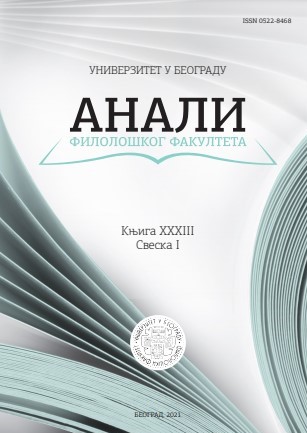On rid and the origin of the get-passive
DOI:
https://doi.org/10.18485/analiff.2021.33.1.7Keywords:
rid, get-passive, reflexive, adversative passive, language contact, Old NorseAbstract
This paper analyses the history and semantic/functional characteristics of the English verb rid in relation to the development of the get-passive. In earlier occurrences of the get-passive during the Late Modern English period, a serial verb get rid of is frequently found, to the extent that the collocation of get and rid deserves special attention to evaluate the impact of the serial verb on the development of the get-passive. Rid seems to possess some peculiar grammatical characteristics associated with the get-passive and not with the be-passive. In particular, an adversative/benefactive reading, a function not expressed by the passive among the Indo-European languages, can be found in the get-passive. It may be this peculiarity that allows both the get-passive and rid to form a serial verb. Therefore, it is highly possible that rid has had some impact on the development of the get-passive. It is hoped that this paper offers a new piece of evidence to help solve the conundrum of the origin of the get-passive.
Downloads
Published
How to Cite
Issue
Section
License

This work is licensed under a Creative Commons Attribution-ShareAlike 4.0 International License.
Authors who publish with this journal agree to the following terms:
- Authors are confirming that they are the authors of the submitting article, which will be published (print and online) in the journal Anali filološkog fakulteta by the Faculty of Philology, University of Belgrade (Faculty of Philology, Studentski trg 3, 11000 Belgrade, Serbia). Author’s name will be evident in the printed article in the journal. All decisions regarding layout and distribution of the work are in hands of the publisher.
- Authors guarantee that the work is their own original creation and does not infringe any statutory or common-law copyright or any proprietary right of any third party. In case of claims by third parties, authors commit their self to defend the interests of the publisher, and shall cover any potential costs.
- Authors retain copyright and grant the journal right of first publication with the work simultaneously licensed under a Creative Commons Attribution-ShareAlike 4.0 International License that allows others to share the work with an acknowledgement of the work's authorship and initial publication in this journal.
- Authors are able to enter into separate, additional contractual arrangements for the non-exclusive distribution of the journal's published version of the work (e.g., post it to an institutional repository or publish it in a book), with an acknowledgement of its initial publication in this journal.
- Authors are permitted and encouraged to post their work online (e.g., in institutional repositories or on their website) prior to and during the submission process, as it can lead to productive exchanges, as well as earlier and greater citation of published work.





